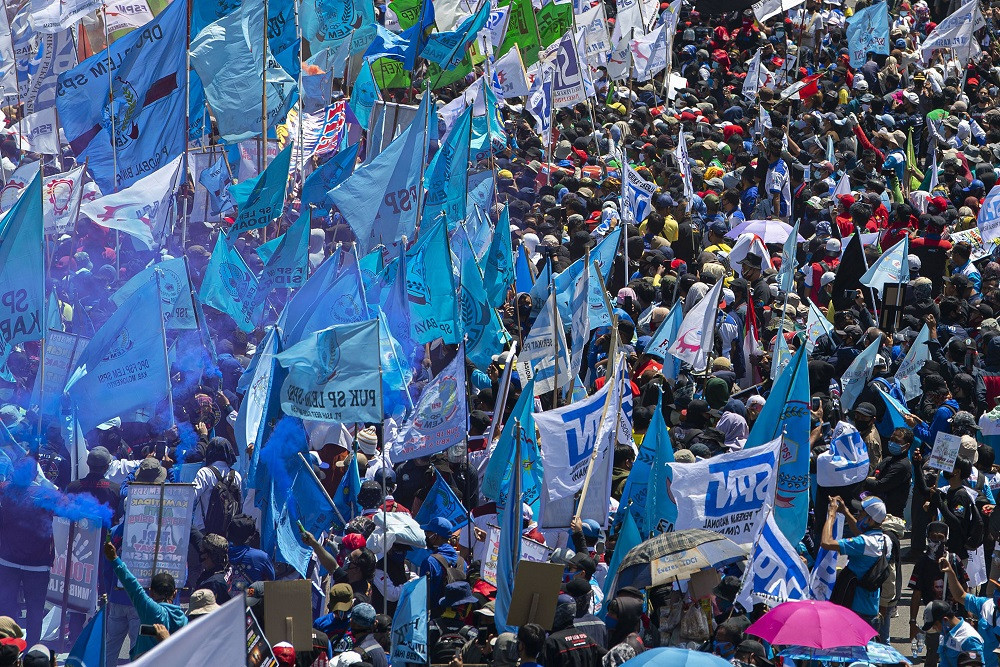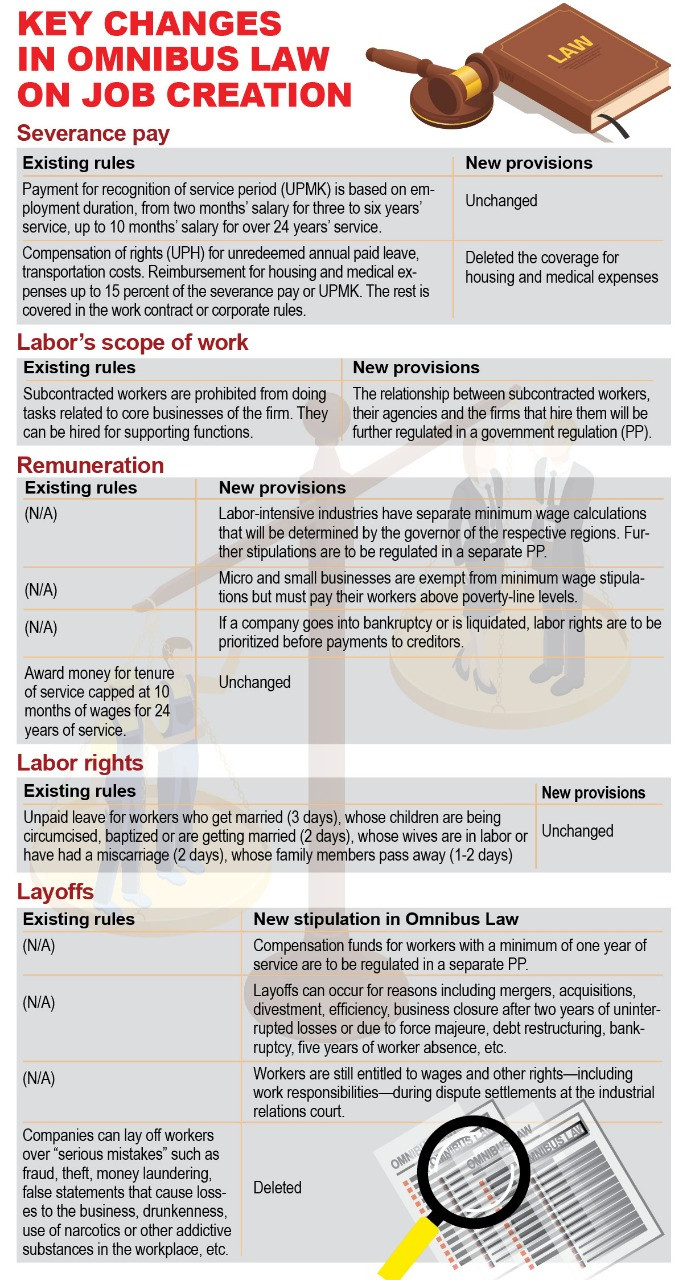Popular Reads
Top Results
Can't find what you're looking for?
View all search resultsPopular Reads
Top Results
Can't find what you're looking for?
View all search resultsIndonesia passes jobs bill as recession looms
The Job Creation Law, which is one of President Joko “Jokowi” Widodo’s key priorities in his second and final term, is expected to improve bureaucratic efficiency and cut red tape, particularly in regard to business permits and investment.
Change text size
Gift Premium Articles
to Anyone
T
he government and the House of Representatives passed on Monday the controversial omnibus bill on job creation into law, which is expected to bring a radical change in the country’s labor system and natural resources management.
The final draft of the bill, a copy of which was obtained by The Jakarta Post, is 905 pages long and amends 79 prevailing laws, including the Labor Law, the Spatial Planning Law and Environmental Management Law.
The Job Creation Law, which is one of President Joko “Jokowi” Widodo’s key priorities in his second and final term, is expected to improve bureaucratic efficiency and cut red tape, particularly in regard to business permits and investment.
The government’s expectation has pushed the law to make significant adjustments to labor rules and business licensing processes, all of which have been criticized, as they are considered to infringe on labor rights and put the environment at risk.
Until the moment of its passage, the law met mounting resistance from labor unions and environmentalists as well as rejection from House factions of the Democratic Party and the Prosperous Justice Party (PKS).
Read also: Police stop labor unions from protesting newly passed omnibus bill on jobs
In a plenary session on Monday, led by Deputy House Speaker Azis Syamsuddin of the Golkar Party, House Legislation Body (Baleg) chairman Supratman Andi Agtas said the deliberation of the bill had taken place from April 20 to Oct. 3, adding that lawmakers and the government had been holding meetings, even on weekends, to expedite the deliberation.
"The deliberation was careful enough until the end. All factions paid attention to workers' rights in the decision-making process,” the Gerindra Party politician said.
A number of President Joko “Jokowi” Widodo’s Cabinet members were present during the plenary, including Coordinating Economic Minister Airlangga Hartarto, Finance Minister Sri Mulyani Indrawati, Manpower Minister Ida Fauziyah, Law and Human Rights Minister Yasonna Laoly and Home Minister Tito Karnavian.
Airlangga said the law was necessary as the country needed to increase employment and improve the business climate following the pandemic.
"We are now working to handle COVID-19, which has had a significant impact on the global and national economy. There were 43,600 regulations that needed to be sorted out before the pandemic and our competitiveness is also lagging behind in ASEAN," Airlangga, who is also the Golkar Party chairman, said.
The law is also seen as necessary by the government since the country’s economy shrank 5.32 percent in the second quarter this year, and is widely expected to record the first economic contraction since the 1998 Asian financial crisis this year.
Read also: Indonesia’s annual GDP set to contract for first time since 1998
Seven House factions have conveyed their approval of the bill, which is one of Airlangga’s flagship programs, namely the Indonesian Democratic Party of Struggle (PDI-P), Golkar, Gerindra, the NasDem Party, the National Awakening Party (PKB), the National Mandate Party (PAN) and the United Development Party (PPP).
Labor groups on the same day held protests against the bill in several locations as the police prevented them from holding a mass rally in front of the House compound in Senayan, Central Jakarta.
Read also: Workers set to strike as House, govt agree on labor cluster in jobs bill
Ahead of Monday’s plenary, social media users expressed their frustrations over the bill by writing posts with the hashtags #DPRRIKhianatiRakyat (House betrays the people), #BatalkanOmnibusLaw (cancel the omnibus law) and #MosiTidakPercaya (vote of no confidence).
Civil society organizations, grouped in a coalition calling itself the Indonesian People's Faction (FRI), have also voiced their disappointment, saying the state has turned a blind eye to popular opposition to the controversial bill, which the FRI believes only accommodates business interests.
“We’ve [issued] a vote of no confidence. The people demand an end to the deliberation and a cancellation of the job creation bill. The government and House have betrayed the people and the 1945 Constitution," the coalition said in a written statement on Monday.
As companies have fallen into financial difficulties during the pandemic, the unions have expressed concerns that the law would make it easier for businesses to lay off workers.
Among the points that have been agreed is abolishing the sectoral minimum wage (UMSK) by only recognizing the provincial minimum wage (UMP) and regency or municipality minimum wages (UMK).
According to the law’s Article 88C, governors can set their region's minimum wage at provincial and regency or city level in line with the area’s inflation and economic growth rate.
The government and lawmakers have also agreed to lower maximum severance pay for laid off workers and introduce a new unemployment fund (JKP), which effectively means the government will shoulder part of the company’s cost when they lay off their workers.
According to the law, employers could pay a maximum of 19 times the monthly salary, and an additional six times the monthly salary will be paid by the government through the JKP scheme.
The JKP scheme will be managed by the Workers Social Security Agency (BPJS Ketenagakerjaan). Article 46E of the bill stipulates that the source of funds for the JKP scheme, which currently has yet to be established under the country’s social security system, will come from the government, workers' premiums and BPJS Ketenagakerjaan operational funds.
The law also stipulates that BPJS Ketenagakerjaan is set to receive Rp 6 trillion from the state budget to run the JKP scheme, but there have been no guarantees that the funds will be disbursed for those who will face termination immediately.
Key changes in omnibus law on job creation (JP/File)










